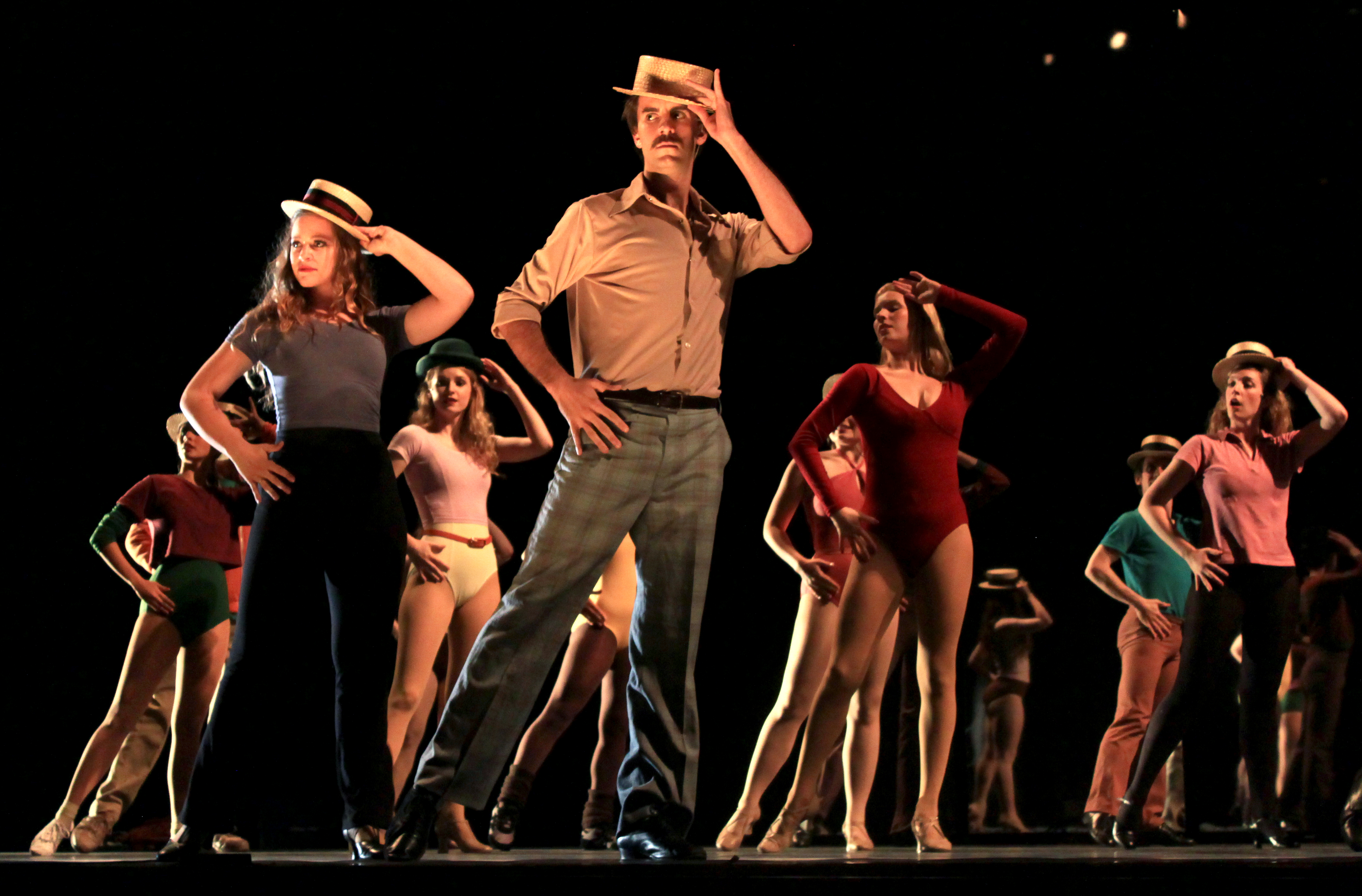“˜A Chorus Line,’ running at the Freud Playhouse, mirrors lives of UCLA theater students

“A Chorus Line,” this year’s musical put on by the UCLA Department of Theater and playing at the Freud Playhouse, closely examines the lives of 17 dancers vying for only eight spots on a Broadway chorus line.
By Daniel Boden
May 23, 2012 11:31 p.m.

Gwenna McKee went through the same highs and lows that the characters in “A Chorus Line” experienced when she was initially not cast for the production. Later, she was contacted by the director who said that she was needed in the show.
Gwenna McKee went into the audition determined to do her best. She got a callback for two parts. But when the cast list was posted, her name was not on it.
McKee, a second-year musical theater student, said she had to swallow the rejection when she was not cast for “A Chorus Line,” this year’s musical put on by the UCLA Department of Theater.
The show, which closely examines the lives of 17 dancers vying for only eight spots on a Broadway chorus line, reveals to audiences the same reality that McKee experienced: In the theater world, not everyone makes the cut.
But a week later, McKee was checking her emails in a class taught by the play’s director Jeremy Mann and she received a notice instructing her to pick up her script.
“I was about to stand up and ask Jeremy, “˜Is this a mistake? You’re just teasing me with this at this point,'” McKee said. “But instead he said, “˜Did you get that email? I wanted to talk to you.'”
Someone had dropped the part and McKee was asked to fill the vacancy in the ensemble. She had just gone through the same highs and lows that the 17 principal dancers experience onstage in “A Chorus Line.”
“The story is timeless. The themes are timeless,” Mann said. “People relentlessly pursuing what they love despite the fact that it’s incredibly difficult and the competition is fierce.”
Jane Lanier, the show’s choreographer, auditioned on Broadway in the days of brilliant but temperamental choreographers such as Bob Fosse, Michael Bennett and Jerome Robbins and said she knows of the competitive experience firsthand.
Lanier auditioned for Fosse in 1986, trying to land a spot in the revival of “Sweet Charity.” She explained how 700 girls auditioned, 90 made callbacks and around 30 made it to the last round of auditions. They danced for more than eight hours. And then they waited two weeks to hear back.
“Just like those kids standing on the line for two hours. The dancing’s difficult. They have to be triple threats … holding their nerves, holding the yearning to get the show,” Lanier said. “It’s one of the most emotionally exhausting shows I’ve ever done.”
The emotion comes from more than just demanding dance routines ““ a series of interviews with Broadway dancers during the mid-1970s served as creative fodder for the creators of “A Chorus Line,” said Emma Degerstedt, a second-year musical theater student playing Cassie, the female lead.
“The more they went along with the interviewing process, the more people opened up and that’s really portrayed in the show,” Degerstedt said.
The experiences that Degerstedt recounts onstage are not her own, but she said that she relates to her character by writing notes in her script that remind her of her own memories of her theater career.
“I have a character who I’m very similar to. I had a lot of success when I was younger,” Degerstedt said.
“Then I had four or five years where I didn’t have anything because I was in high school and I couldn’t audition as much. It was really rough for me that I went through this awkward phase in my life where I just wasn’t castable.”
The characters in the play reveal their life stories to Zach, played by fourth-year musical theater student Ian McQuown. Modeled after directors like Fosse, Bennett and Robbins, Zach’s desire to intimately know his dancers gives the musical its narrative frame.
Although Zach’s decision-making power places him in a scenario with a different set of problems than those auditioning, McQuown said that he still relates to the excitement and anxiety of trying to get the job.
“There are classes your senior year at UCLA that are designed to either get you an agent or at least give you really good audition technique,” said McQuown, who plans on staying in the L.A. area to work in film, TV and musical theater.
McQuown said that actors have to sell themselves, but that he hoped the play would humanize actors beyond mere products.
“At the very end of the play,” McQuown said, “it’s important that all the actors … and hopefully the audience realize that every single one of those (dancers) are worth it and valuable as people … just like everyone is honorable for pushing on every day.”


